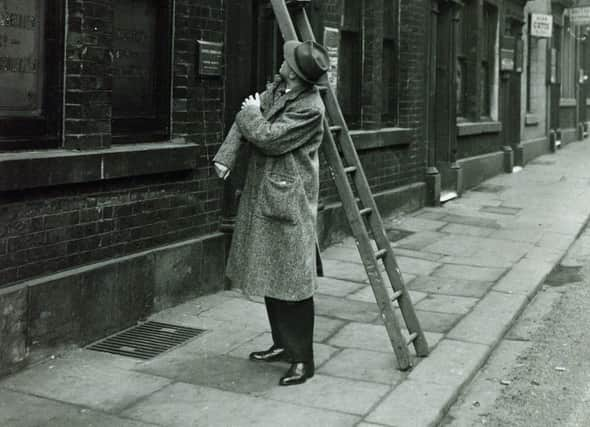Would you ever walk under a ladder?


When I see how many of them cross themselves, I’ve thought how amazing it is that so many of them are so religious.
However, it seems it has little to do with any particular religion, but all to do with superstitions.
Advertisement
Hide AdAdvertisement
Hide AdThey are asking their god for favour, for protection against injury and above all, that their team should win.
There seems to be few footballers who are immune from superstition before a match, to include some of the biggest names.
Neymar must speak to his father before every match, Luis Suarez kisses his wrist after every goal he scores as he has the names of his children tattooed on it, Mesut Ozil recites the Quran as he walks onto the pitch and Cristiano Ronaldo has a haircut before every game.
But you would be wrong to think it is only foreign players who indulge in superstitious rituals.
Advertisement
Hide AdAdvertisement
Hide AdPhil Jones, who plays for Manchester United, makes sure he leaves plenty of time for his.
He must be the last one out onto the pitch, after being the last one to put on his shirt. He puts his right sock on first if it’s an away match, and his left sock on first if it’s a home match!
And he doesn’t like to step on the white lines on the pitch – he feels that is bad luck.
And if you think footballers are superstitious, the list of dos and don’ts in the theatre are mind-blowing!
Advertisement
Hide AdAdvertisement
Hide AdNever whistle in a theatre. Never utter the word ‘Macbeth’. Don’t wish an actor ‘good luck’ – the correct phrase is ‘Break a leg!’ No real money or real jewellery can be used and definitely no peacock feathers, as they feature an evil eye.
It is considered very bad luck to present flowers before a performance and never ever bring a mirror on to the stage, in case it breaks – that would bring seven years bad luck not only for the actor but for the theatre.
And bizarrely, it is customary to present flowers to the director or leading lady on the last night of the performance, but only those stolen from a graveyard!
In fact, superstitions are something many people firmly believe in whatever walks of life they are from. They perform rituals as a matter of course without really knowing why they are doing it. And as a person who is not remotely superstitious, I’m afraid I think it is all a load of old rubbish.
Advertisement
Hide AdAdvertisement
Hide AdTake some of the more common superstitions. Bad luck to spill salt and counteracted by throwing it over the shoulder. In 3,500BC, the Sumerians believed it was unlucky to spill salt, with this belief spreading to the Egyptians, Greeks and beyond.
Walking under a ladder. The Ancient Egyptians were convinced that the triangle was sacred. Hence the shape of the Pyramids. And if you place a ladder against a wall it makes a triangular shape.
Don’t open an umbrella indoors. Simply a safety precaution dating back to Victorian England when newly invented umbrellas had a stiff and clumsy mechanism. Opening one in the house could cause breakages or injury to people.
There is no statistical evidence to support the theory that the number 13 is unlucky, other than the belief goes back to Norse Mythology and the fact there were 13 at the Last Supper.
Advertisement
Hide AdAdvertisement
Hide AdHowever, there is a real fear with some people of Friday 13th and it is called Paraskevidekatriaphobia.
It is one of the most widely practised superstitions with rows on aircraft going from 12 to 14, and house numbering ignoring the number 13, which is actually true where I live.
In China, the number eight is considered a very lucky number and much sought-after when buying houses. Although there isn’t a particularly lucky number in the Western world, many mathematicians and scientists consider 12 to be the perfect number.
‘See a pin and pick it up, then all day you’ll have good luck’. This apparently is also true of coins, but it’s not a good idea to walk looking down at the ground!
Advertisement
Hide AdAdvertisement
Hide AdPeople believe that bad luck comes in threes, but equally that good luck also comes in threes – and that carrying a rabbit’s foot will also bring luck, although it wasn’t very lucky for the poor rabbit!
Black cats are said to be unlucky as they were witches’ familiars in the Middle Ages. Also unlucky are magpies. It is customary to salute one if you see one, to stave the bad luck off!
We’re all used to the practice of pulling a wishbone when eating a turkey or chicken. The person who got the larger piece was sure of some good luck on the way.
The Ancient Romans believed that chicken bones held the power of good fortune, although the term wishbone dates to America in the 1850s and is a popular ritual at Thanksgiving dinners.
Advertisement
Hide AdAdvertisement
Hide AdSaying ‘God bless’ when someone sneezes dates to the 6th Century, when Pope Gregory the Great was faced with a terrible pestilence in his country and hoped to ward it off with God’s help.
And as for horseshoes bringing good luck? It seems that St. Dunstan, Archbishop of Canterbury in 959, who was also a blacksmith, was asked by the Devil to shoe his hoof.
He agreed, on condition the Devil never entered any premises where a horseshoe was displayed, to which the Devil agreed.
A load of codswallop? Well, possibly, but come to think of it, I’ve never seen the Devil anywhere a horseshoe has featured. Have you?